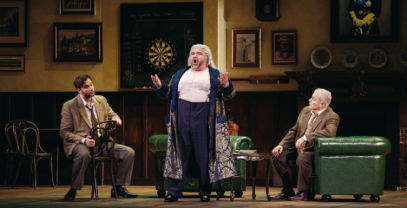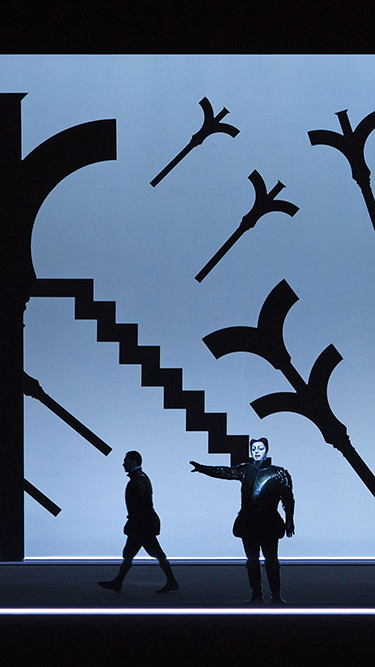
Opera
FALSTAFF
Giuseppe Verdi
Opera
Giuseppe Verdi
152'
From to
Conductor Stathis Soulis
Director, design, lighting Robert Wilson
Co-Director Nicola Panzer
Associate set designer Serge von Arx
Costumes Jacques Reynaud, Davide Boni
Associate lighting designer Marcello Lumaca
Hair & Make-up artist Manuela Halligan
Video Tomasz Jeziorski
Dramaturgy Konrad Kuhn
Chorus master Agathangelos Georgakatos
Children’s chorus mistress Konstantina Pitsiakou
With the GNO Orchestra , Chorus and Children’s Chorus (as part of its educational mission)
Otello Aleksandrs Antoņenko
Desdemona Cellia Costea
Iago Tassis Christoyannis
Cassio Dimitris Paksoglou
Roderigo Yannis Kalyvas
Lodovico Petros Magoulas
Montano Marinos Tarnanas
A Herald Pavlos Sampsakis
Emilia Violetta Lousta
Il n’en reste pas moins que le metteur en scène américain demeure un maître de l’image et que la force de son propos peut toujours nous surprendre, voire nous émerveiller.
Tassis Christoyannis grâce à l’extrême mobilité de son visage, à vraiment jouer, apportant un aspect luciférien à ce jaloux compulsif, dont il traduit à merveille la schizophrénie destructrice.
La ligne de chant de la soprano roumaine est pleine d’intensité, et l’on sent poindre la rage contenue dans son ultime prière.
Aleksandrs Antonenko opère un retour fracassant sur la scène lyrique. Quasiment absent depuis le début de la pandémie, le ténor letton apparaît, dans ce personnage d’Otello qu’il a si souvent incarné, comme rajeuni. Maître d’une voix tranchante, aux phrasés ciselés, il transforme chacune de ses apparitions en un moment unique, que l’on savoure immensément.
François Lesueur, Opéra
With his “mannerist” approach (the highly recognisable, and recognised signature style of his work), the 81-year-old artist takes a step forward to make us a proposal: an opera that “resonates” on stage like chamber music, without sacrificing its air of grandeur. Balanced firmly between “fire and ice” with minimal means. The geometries of the stage and the lighting palette reign supreme. Light creates the scenic space – it is the canvas on which the story is inscribed. The psychological landscape alternates: deep blue, icy white, red. The hatred of Iago, the unadulterated devotion of the beautiful Desdemona, the cornered Moorish general, insecure, weak in his fitful power, forever the foreigner.
Maria Katsounaki, Kathimerini
Fill in your ticket in the field below
Don't have a ticket?
Please click below in order to buy tickets for the GNO TV performances.
...
